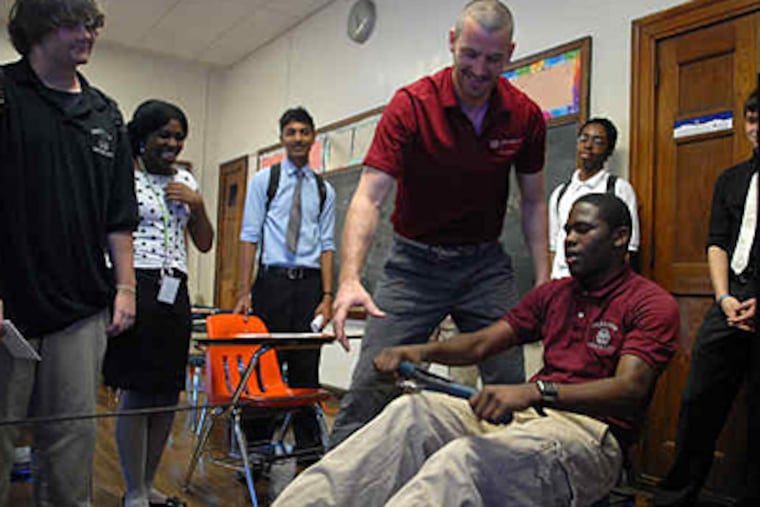Selling rowing as an urban escape
Olympic gold-medal champion Dan Beery was nervous. There he was, 35 years old, 224 pounds, 6 feet, 7 inches of world-record-holding athlete. A man who had clobbered tough competition. But now he faced a classroom of skeptical, seen-it-all students.

Olympic gold-medal champion Dan Beery was nervous.
There he was, 35 years old, 224 pounds, 6 feet, 7 inches of world-record-holding athlete. A man who had clobbered tough competition. But now he faced a classroom of skeptical, seen-it-all students.
Who wouldn't be intimidated?
Beery had 15 minutes to sell these students from Parkway Center City High School on the joys of rowing. To get them to sign up for the privilege of climbing into a pea pod of a boat on the Schuylkill and then rowing as hard as possible until their lungs screamed, their thighs burned, and their arms went numb.
The program is called Philadelphia City Rowing, the first rowing club exclusively for Philadelphia's public school students. It's free, Beery explained, and anyone who joins will get a uniform, coaching, and the use of 12 boats in the club's $30,000 yard on hallowed Boathouse Row.
Running a slide show to illustrate Beery's talk was a fit woman with blunt-cut hair and hazel eyes - Libby Peters, a 27-year-old world-class rower from Utica, N.Y.
Peters is the one who dreamed up PCR, and then recruited Beery and others to help spread the gospel.
"We want these kids to connect to their city in an entirely different way," said Peters, who has been making the rounds of city schools for two months to recruit students. "You shove off the dock, and all of a sudden it doesn't feel like you're in a city. There are birds and wildlife."
After rowing in boarding school, Peters got a scholarship to Columbia University. In New York, she volunteered for a nonprofit group, Row New York, that taught inner-city girls to row competitively. The after-school program started in 2002 with eight girls and now has more than 300.
"I saw the girls blossom remarkably," she said. "And all of them went on to college."
In 2007, Peters moved to Philadelphia to train with Vesper Club coaches. The next year, she made the national team, finished second in the Olympic trials, and went on to win a bronze medal as part of a four-woman team in the world championships.
Then she got cancer.
During her recovery, Peters' Olympic ambitions gave way to different goals.
"I realized I wanted to start a program like Row New York." She wrote a business proposal. By November, PCR had a board of directors, grant money to get started, and the city's cooperation.
Fairmount Park gave the club permission to build a 24-by-72-foot boatyard next to Lloyd Hall at 1 Boathouse Row. (Construction is set to begin this weekend.)
The goal in bringing in athletes like Beery is to convince students that even if rowing lacks the glamour of basketball or football, it is awesome. It will make them muscle-rippling strong, teach determination, and maybe get them a college scholarship.
"How many of you have been in a boat before?" Beery asked, then waited a few awkward seconds, searching blank faces for a hopeful sign.
Nothing.
"Well, that's OK," he started. From the back, he was relieved to see, a hand shot up. "The Spirit of Philadelphia!"
For most of the city's students, the idea of rowing in a regatta on the Schuylkill seems as likely as competing in dressage at Devon.
True, the great oarsman John B. Kelly Sr. was a bricklayer. True, you don't need to be rich to join most of the clubs. And true, others have reached out to these students before. At least three other programs give them a chance to row, and one charter school has a competitive team.
But PCR is the only one just for Philadelphia students and with its own space.
Recruitment has gone slowly.
"I think swimming will be a small hurdle for some," Peters said, even though PCR will teach any nonswimmer the basic skills.
Beery told students of rowing's pain - "pushing so hard you want to puke" - and glory. The 2002 world-championship silver in Seville, Spain. The 2003 world-championship gold in Milan, Italy. And the 2004 Olympic gold in Athens, Greece.
The first question he got?
"I realize it's an amateur sport. But every time you win, don't you get paid?"
"Not really," Beery replied, explaining about loans, rent, and lost time at work.
"Life is hard," he said. "Life will break you down. But you know what? Opportunities like this teach you to take on a challenge, and that's what it's all about."
Peters, a little alarmed by the "break you down" line, tried to lighten the mood.
"We're holding three two-week sessions over the summer," she told the class. The only requirement is to pass a rudimentary swim test June 16 at Drexel University.
Then she and Beery pulled out an indoor rowing machine. The class gathered in a tight circle for a demonstration. But when it was the students' turn, no one volunteered. So Beery had to reel them in.
"Let's take off that tie!"
"We got hair flying! We're feeling that breeze!"
"Relax those shoulders!"
Simone Mitchell, 17, watched his classmates struggle to coordinate their arms and knees, teasing them, "Faster!"
But when Beery told him to get on the machine, he balked.
"C'mon, Simone!" the classmates he had razzed said, grabbing his arm and hustling him toward Beery.
Mitchell strapped in and began rowing like mad.
"You're a natural," Beery said.
"Oh, man! I feel loose!" Mitchell said, laughing. "I feel like I can go buck wild!"
So far, Peters said, 82 students have signed up. Including 19 from the Parkway school - including Mitchell.